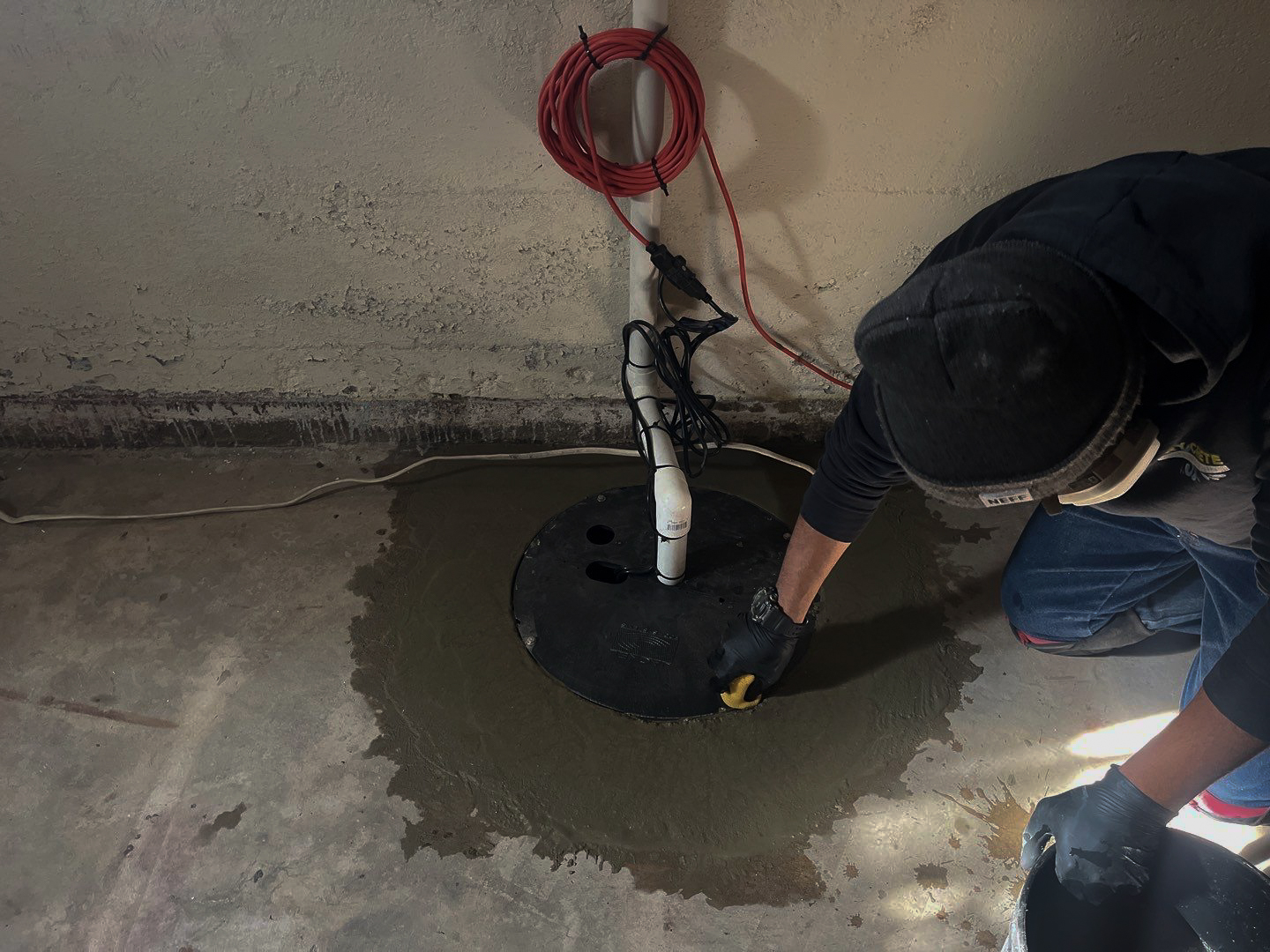Sump pumps are crucial for homeowners who want to keep their basements dry and safeguard against potential flooding. Tucked away in your basement, a well operating pump should be out of sight, out of mind. However, in some instances you may notice that your sump pump is operating more often than usual. Perhaps you’ve just had your sump pump installed and you’re wondering when it will turn on and how often. To understand how often your sump pump should run we’ll first have to understand the what and how of sump pump operation.
What is a sump pump?
A sump pump sits inside of a sump pit which is a perforated container recessed into your concrete slab and installed at the lowest point in your basement. Your sump pump has various components that work in concert to ensure water is pumped out of your home.
The important components of your sump pump:
- Motor: The motor is the power source of the sump pump, responsible for driving the pump’s operation.
- Impeller: The impeller is a rotating component within the sump pump that creates centrifugal force, propelling water out of the pit and through the discharge pipe.
- Float Switch: The float switch is a crucial mechanism that activates the sump pump when the water level in the pit rises to a certain point. It is typically attached to a float that rises and falls with the water level.
- Check Valve: The check valve is a one-way valve installed in the discharge pipe. It prevents water from flowing back into the pit once it has been pumped out, ensuring efficient water removal and preventing the pump from reactivating unnecessarily.
- Discharge Pipe: The discharge pipe is a pipe that carries the pumped water from the sump pump to a suitable location outside the house, such as a drainage system, dry well, or detention pond.
- Housing/Casing: The housing or casing encloses and protects the internal components of the sump pump, such as the motor, impeller, and float switch.
How often should a sump pump run?
Under normal, dry weather conditions, your sump pump shouldn’t run at all. However, it should remain on standby, ready to be activated when the float switch is triggered. As ground water rises in your sump pit the float switch will rise with it and will eventually trigger your sump pump to turn on. As the water is pumped out of your pit the float switch will lower, turning your pump off. This is known as a cycle.
There are certain factors that affect the cycle frequency of your sump pump. In regions with frequent rainfall, homes with a high-water table, or soil that contributes to poor drainage, your sump pump may run quite often, sometimes multiple times per day. Conversely, in areas with less precipitation, your sump pump will be called upon far less frequently.
It’s important to note that a sump pump should only operate when necessary, indicating that the water level in your basement has reached a specific threshold.
Can Sump Pumps Run Continuously?
As we explained, your pump is designed to cycle on and off as the level of ground water rises and falls. Should you find that your sump pump operates non-stop, even when there’s no precipitation, it’s a clear indication that the device is experiencing a malfunction. Let’s explore some common problems that might cause your sump pump to run excessively and discover potential solutions.
Mechanical Problems with the Sump Pump
Various mechanical issues can lead to your sump pump running more frequently than necessary.
- Inadequate Power: If your pump is undersized for your large home or unable to meet high demands, consider investing in a more powerful pump that can effectively handle the workload.
- Faulty Float Switch: A clogged, obstructed, or broken float switch can trigger excessive activation or get stuck in the “on” position even when the water level has subsided. Addressing float switch issues is vital to optimize energy efficiency.
- Clogged or Frozen Discharge Line: When the discharge line is obstructed or frozen, preventing proper water drainage, the sump pump will continue to run. Locating and resolving the clog or frozen section is crucial for the pump to resume normal operation.
- Broken Check Valve: A broken check valve allows water pumped out by the sump pump to flow back through the exit pipe, causing the pump to run continuously. Replacing the check valve will restore proper functioning.
Each of these mechanical issues can be solved by replacing the malfunctioning part or upgrading your sump pump. It’s always a good idea to have a professional assess the situation to ensure you have identified the correct solution.
A Broken Water Main Underground
To determine if a broken water main is to blame, simply turn off the water main and observe if the problem persists. If you determine that a broken water main is the cause of your excessive water then you should call an emergency plumber or your towns Public Works.
Negative Ground Grade
If your home’s foundation has a negative grade, meaning the surrounding ground slopes towards your foundation, rainwater might drain toward the structure instead of away from it. This can cause all the water that you’re pumping out to flow right back into your sump pump.
In such cases, raising the grade around your home can redirect the flow of water and alleviate the problem. At Drycrete Waterproofing when we install a new sump pump and discharge line, we always assess the grade of the soil around your foundation. This helps us identify the best area to discharge your pump where the grade will take the water away from your foundation rather than back towards it.
Groundwater Level
For situations where groundwater levels contribute to excessive water accumulation in your basement, more comprehensive waterproofing solutions such as French drains may be your best option. Installing a French drain along with your sump pump greatly increases the capacity of your system. A French drain is the highway that guides groundwater where it needs to be, in your sump pit, and your pump is the motor that drives the water away from your home.
Trust the Experts at Drycrete Waterproofing
If you suspect that your sump pump is not functioning optimally, it’s wise to consult with experienced basement waterproofing professionals. At Drycrete, our knowledgeable and caring team of technicians can assess your sump pump’s performance and recommend the most appropriate course of action.
Whether you require sump pump maintenance, repairs, or alternative drainage options for your basement, reach out to Drycrete for a free estimate today. We’re here to provide you with personalized solutions and ensure your peace of mind.

